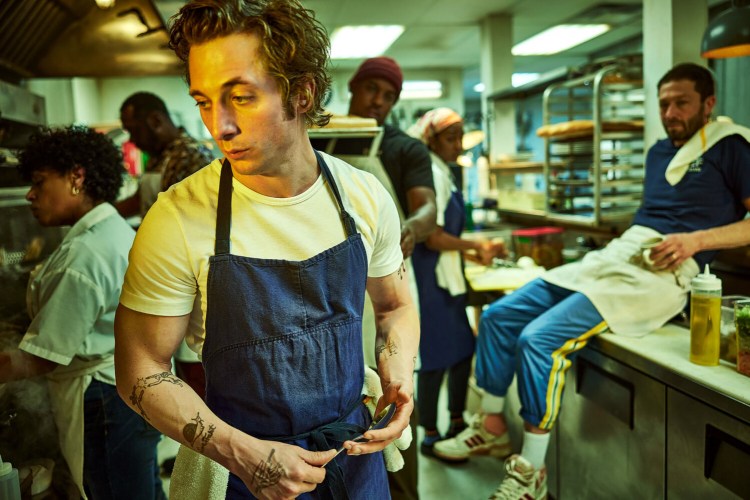People love to fact-check works of fiction. Don’t get a doctor started on “Grey’s Anatomy,” or a New Yorker on that “JFK Express” train to Grand Central Terminal in the new John Wick movie. So it seems significant that chefs and food-world people are connecting with Hulu’s “The Bear” instead of nitpicking it.
The exhilarating series from FX/Hulu follows Carmen “Carmy” Berzatto, a fine-dining chef who inherits his family’s greasy spoon, as he tries to wrangle the failing sandwich shop’s mutinous staff and precarious finances – and his own plentiful demons. “The Bear” gets a lot right about restaurant kitchens. The claustrophobia-inducing, breakneck-speed-running back of the house of the Original Beef of Chicagoland, the Chicago sandwich joint that has fallen to Carmy after his older brother’s suicide, is where almost all the action takes place.
Even before viewers digest the essential truths about restaurant life that “The Bear” captures, they’re immersed in the visual patois of a professional kitchen. Here, plastic food containers are used for just about everything, including drinking water and mopping the floor. An ancient, rattling Hobart mixer is perpetually on the fritz. Carmy’s desk is littered with unpaid invoices and notices, the detritus of a floundering business – as well as half-empty bottles of Fernet-Branca and Pepto-Bismol, both common food-world swigs.
The team avoids collisions by yelling “corner” and “behind” when navigating around one another and the blind spots in the rabbit warren of a kitchen. Banter and f-bombs permeate the air like steam from the hunks of meat braising in the massive range. Everyone is always in the weeds.
The show also uses the sounds of a kitchen to transport the viewer inside the belly of the Beef, as the family restaurant is known. The opening sequence of the first episode is preceded by a black screen and the click-click-click-woosh of a gas burner being lit, an aural flourish that captures both the setting and the combustible undercurrent that runs throughout the series – the sense that at any moment, the whole thing could just go boom. Elsewhere we hear knives thwacking against cutting boards, pans rattling across stoves, onions sizzling in pans and the ticking of the clock that signals the start of service.
The characters, too, reflect a more nuanced view of the people who make food than we’ve seen in many other small- and big-screen depictions of restaurants. It presents the tropes of chefs we’ve become used to seeing on screen – particularly in the brooding, relentlessly driven Carmy – only to subvert them. Carmy might have the look of a “Kitchen Confidential”-era Anthony Bourdain knockoff, all tattoos and wild hair and knife’s edge temper, but he doesn’t aspire to be the kind of auteur whose genius excuses the abuse he ladles out to his staff. (Expect to see more of this archetype, taken to the extreme, in the upcoming horror movie “The Menu,” in which Ralph Fiennes plays a godlike chef whose minions snap to attention at his every clap.)
In Carmy’s kitchen – at least the one he tries to create – great food is the work of a functional team, with everyone contributing. He knows he can’t do it alone, so he enlists the help of recent culinary-school graduate Sydney, an ambitious and talented but green chef who offers a vision of what the restaurant could be. “It doesn’t have to be a place where the food is s—ty and everybody acts s—ty,” she says.
Richie, a rough-edged loudmouth who was Carmy’s late brother’s best friend, is the avatar of the toxic restaurant-kitchen culture that may be all too real. He mocks one of Carmy’s culinary touchstones with a homophobic slur, “Escoffi-gay,” and he refers to Sydney as “sweetheart.” But even Richie is shown in all his complicated fullness. Behind his bluster, he knows he’s a jerk and a screw-up, and he’s genuinely pained by it.
“The Bear” is not a starry-eyed love letter to the profession. Still, it offers plausible, sympathetic explanations for why someone would choose such a physically grueling, emotionally wrenching life. In a seven-minute monologue delivered as a confession to an Al-Anon group, Carmy explains how his culinary ambition started as a way to prove himself to his charismatic brother. Eventually, his punishing career became an escape from their strained relationship, satisfying something in him even as it pushed him further into isolation. “The routine of the kitchen,” he says, “was so consistent and exacting and busy and hard and alive, and I lost track of time, and he died.”
Sydney offers another, less bleak motivation for all the sweat and late nights and anxiety that come with pursuing something close to perfection. In a sweet scene with Marcus, the restaurant’s unlikely pastry chef, she recollects dining out with her family as a child, something that felt special even if the food wasn’t Michelin-quality. “That’s what I want,” she says. “I want to cook for people and make them happy.”
Which, of course, isn’t always so easy. Luckily, viewers of “The Bear” get to see the beauty in the struggle.
Copy the Story LinkSend questions/comments to the editors.



Success. Please wait for the page to reload. If the page does not reload within 5 seconds, please refresh the page.
Enter your email and password to access comments.
Hi, to comment on stories you must . This profile is in addition to your subscription and website login.
Already have a commenting profile? .
Invalid username/password.
Please check your email to confirm and complete your registration.
Only subscribers are eligible to post comments. Please subscribe or login first for digital access. Here’s why.
Use the form below to reset your password. When you've submitted your account email, we will send an email with a reset code.